TOMMY COOMES
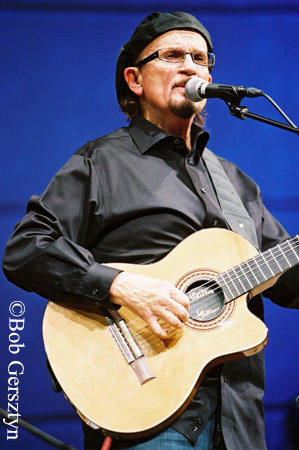
Tommy Coomes live with Love Song, 2010
'Jesus rock' pioneer
Interview and photos by Bob Gersztyn
(December 2021)
Tommy Coomes is a founding member of Love Song, a pioneer Jesus rock band whose nucleus formed in 1970. By 1975, they broke up, but Coomes was also co-owner of Maranatha Records along with Chuck Smith's nephew, Chuck Fromm. Chuck Smith was the Senior Pastor at Calvary Chapel Costa Mesa (in Santa Ana, California), which spawned the Vineyard churches and together, they have over two-thousand churches world-wide along with millions of members. Both churches gave birth to dozens of musicians that needed record labels to record "Jesus Music" on. Coomes helped produce albums and had his own projects over the years, along with an occasional Love Song reunion.
This interview took place on March 18, 2010, 4 months before I photographed a stop on the band's West Coast reunion tour at a Calvary Chapel in Vancouver, Washington. I got to know the band in the early 1970's when they performed at the church I co-pastored in Los Angeles a few times. I was the emcee of the coffee house ministry, introduced music artists and delivered a short sermon and altar call at the end. When Love Song went on a world tour to the Philippines in 1973, my senior pastor, LaVerne Campbell, accompanied them as part of their team. My first assignment as a freelance photographer was to photograph Love Song at a Coffee House in Alhambra, to use in promoting their trip to the Philippines.
Tommy later became the music director for the Billy Graham Organization, as well as Promise Keepers and has his own group, the Tommy Coomes Band.
The purpose of this interview was to get firsthand information about how CCM (Contemporary Christian Music), then known as "Jesus Music," first began, for my then-upcoming book Jesus Rocks The World: The Definitive History of Contemporary Christian Music, vol. 1&2. The book was published by Praeger in 2012 and can be purchased here.
PSF: In your opinion, what is the future of "Contemporary Christian Music?"
TC: Well, I think that the future of "Contemporary Christian Music" is a little confusing and has been confusing for quite a while. Let me kind of take a step back into where I think we are now and how it has evolved.
In the early 1970's, before the label "CCM," there were not that many artists out there other than Love Song, Larry Norman and Andrae Crouch at the very beginning and Mylon Lafevre. People forget about Mylon Lefevre but one of the first albums that I could relate to was Mylon Lefevre and I think it was called Gospel Ship. I don't know if he was a completely committed Christian because I've heard different stories about this, but it was certainly really musical and rock & roll and lyrical. So those are early memories that I have. When Love Song came to Christ, no one else was doing this. I mean we wanted to make a record and we couldn't find a home which gets down to why didn't Love Song do its first album with Maranatha? They were both released at the same time. When we came to Christ, we go 'wait a minute, there's "Black Gospel" music and this thing called "Gospel Quartet" or "Southern Gospel" whatever.
We're not from the South so that wasn't the music that we connected with because we had no roots in that and we're not African American so Black Gospel wasn't us. We do music that is more like the Beach Boys, the Beatles and Crosby, Stills, Nash & Young, so we had to kind of find our own way. In the church music, it was a salmon swimming upstream. People were scared of these kinds of things, scared of the counterculture too and all those kinds of things.
PSF: How did you finally decide what to do?
TC: We had to find our own way and Larry Norman who we met when we were about a month old in the Lord in Northern California and had that album out on Capitol Records called Upon This Rock and then we met Andrae early on. Andrae superseded "Black Gospel" music and found a very different line. We would play with him 2 or 3 times a week all over Southern California. At least once a week, even at Explo 72, we saw him all the time. They weren't traditional "Black Gospel." Certainly, they had that at the root but Andrae's music was so deeply spiritual, so vibrant, so musical, so full of things that are kind of intangible. Everybody did Andrae's music, everybody loved Andrae's music, but that was pretty much it. (2) Worship music, I mean scripture in song, L-R Dale and David Garratt were doing that in New Zealand and Australia. It hadn't touched my world yet that I knew of. Bill Gaither certainly was around but these were different kinds of music and it seemed like a completely different world to me and of course, I didn't know about Audrey Meier and some of these great songwriters that had come before us. That was a completely different segment of music although we probably did their songs at Calvary Chapel as well.
PSF: So how did you finally find your place in church music.
TC: There were little gospel songs that you did at camp or something, but I didn't know the origin of any of this type of music. There were no bands to see other than those. Larry was up in the Hollywood area, we were down in Orange County and Andrae was out in the Valley. We didn't see Larry very much in a lot of those early Southern California concerts because he was probably off someplace else. We really didn't do that many concerts with Larry that I can recall. I guess he was kind of a headliner and we would be a headliner and you're off doing your own thing responding to the requests of people. Those early days were sort of like a whole new thing being birthed and I don't really think that any of us understood. I was talking to Andrae recently and he said I think that God put these callings and appointments on a few. I think God put appointments on us and we really didn't understand it back in those days. That's very possible and I agree with that. He said that God had a design in mind and given our combination of naivete and fearlessness that we were confident that we were following God even though it was the great unknown and a lot of people would look at us funny and say, 'you guys have long hair, you can't be Christians.'
Believe me, when we'd would walk into a church, a youth group would bring us into the church and especially if it was a "Full Gospel Businessman's" at the time or Convention's." We looked like ragamuffins compared to all these finely dressed people. Then they'd bring us to a Sunday morning service at a Presbyterian church and I could tell you by the looks on their faces that they were thinking, "how did these guys get in here?" We were scared to death, we were trembling, we were going "oh my gosh what are we doing here?" We just came out of a drug subculture and all of a sudden, we were with all these conservative people who were suspicious of us and we're just trying to serve God. It was like there was a lot of tension there, and yet we knew that we were supposed to be there. God got us there and we're learning lessons about how to love and how to just sing our songs and let God convince people.
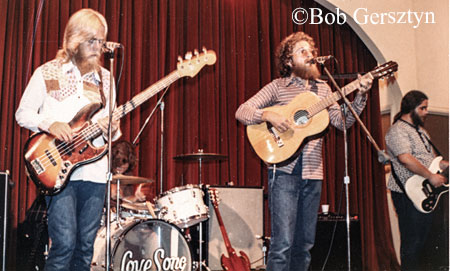
Love Song performing in 1972
PSF: So you let God do the convincing through your music, rather than preaching?
TC: I still think that's a really good idea. If God calls you to do something, just do it with all your heart, be kind to people, be gracious and let God do the convincing. I've read all kinds of books about how music and the mind works and spiritual dimensions of music and things like that, but still if anybody tries to say "this is how it works" or "you can't do that," I think that God has designed music with very mystical and spiritual elements that are very powerful, yet it's almost impossible to find words to describe. But when something happens, everybody knows it in the room, that's for sure. When a song brings people to tears or makes you want to bow before God or it just gets you re-thinking things. Everybody knows that there is something going on when something is going on with music.
So in those early days, it was really all about ministry and then connecting to our generation. The driving force was connecting and telling them what we found. I love what Chuck Girard said "back then, all we did was tell them we were blind and now we see." There is something great about that in that it propels us like rocket fuel to play all day long, three times a day, literally for a number of years. There was no entrepreneurship, there was no financial reward. That wasn't even in the equation until all of a sudden we had families. If we would go off for 10 days, we've got a money problem. We need some money to make this all work because we've got house payments, babies and stuff like that to take care of.
PSF: So at that point, you had a responsibility to your family. Did knowing that alter your non-materialistic viewpoint?
TC: We never did anything for money, that's number one. Number two is, probably within a couple of years, there was this kind of like stage 2 with the 2nd Chapter of Acts, Phil Keagy and Paul Clark who was around very early in Kansas City. I'm not exactly sure when, but he started about the same time as us, but we didn't hear about him for about a year. I don't want to leave him out because he is definitely in the very early stages of what we now call "Contemporary Christian Music." Phil Keagy came shortly after. He got saved probably about 1971, if I remember the story right. He was playing with Glass Harp, a secular rock group. It was as great power trio rock band as there ever was and released an album on RCA. Other early pioneers were Andrae, Larry Norman and Mylon Lefevre. Those were the three bands and all of a sudden, the Paul Clark's, Phil Keagy's and then about a year later, Barry McGuire came on the scene it seems. Of course I'm leaving out the Way, Country Faith and all the people that were involved with Maranatha from very early on.
PSF: How did a change in attitude come about?
TC: We were playing these concerts all over the place and Maranatha was formed and it didn't take very long for this next generation of young people who came up to say "well I'm a Christian and I want to do this and I want to do that." I don't know a nice way to say this any better to be honest, but the motivation didn't seem to me to be the same. It seemed to be more about the music and more about "let's see what I can do." A little bit more competitiveness maybe, and not all bad. I like to think of several people and I'll leave their names out of it, but when they first told me "I'm going to be a big star and do this and that," I thought, "what a punk attitude. You obviously don't get this. Where did you come from?" This person I'm talking about turned out to be a very good guitarist for quite a while and I don't take anything away from being competitive or being aggressive or you have a dream that you're chasing hard. I just think that the very first motivation wasn't those things.
PSF: Members of Love Song were all working musicians before you became "Born Again" Christians and Chuck Girard had radio hits.
TC: I mean Chuck Girard already had top 20 hits by the time he was 18 years old. He was one of the top vocal guys in L.A. in the early days of the Beach Boys and "Hot Rod" records ("Little Honda"). So when he came to Christ, it wasn't a big sacrifice, it was a revelation. So it was like, "I don't have to prove anything to anybody. I'm not in competition with my brothers here, I'm just trying to be what God designed me to be and do what's in my heart to do." I'm not saying that's the same case with the next generation and it was goofed up already because I'm bringing up one kind of bad example of kind of missing the mark. If you don't start off with a core direction that is rightly motivated, I would say this to anybody, face to face right now, and if that core base of why you want to do something isn't aligned properly, you're going to shoot that rocket off and it's going to wind up someplace other than the bullseye.
We talked about this for a long time and I may be slightly confused because who knows how this really works or how God calls people and gets them to do different things. I'm not a judgmental kind of person. I just ask a few questions like everybody else about why things aren't the same. I have to go through this kind of logic. I don't just want to just jump ahead. The second generation that came up very quickly in Maranatha and other places evolved so then by 1975, you've got a lot of bands and a lot of musicians and an industry is starting to be developed with marketing and sales tools and even Maranatha signed with WORD Records as a distributor, I believe, in 1978.
PSF: What was the reason that Maranatha signed up with Word?
TC: It's hard to try and collect the money from the people that promised to pay you when you sold them the albums and shipped it to them. It could turn into a hassle and we decided that we wanted to be on the creative side of creating music and doing ministry and let somebody else handle finance, marketing and distribution. So in the long run, it was a wonderful relationship. But the industry was developing pretty quickly in 1974 & 1975 and 1976 there's Myrhh Records, where Billy Ray Hearn has come in. He left Myrhh Records and he started Sparrow Records. A lot of great things happened here. I mean the 2nd Chapter of Acts albums wouldn't have been widely distributed, but they ended up with Billy Ray and his kind of people. I hope that I can say this in the right way because there was room for all the other pieces of the puzzle. When you make music, one of the most famous persons that I know said, "that's the easy part, the hardest part is selling it." I've always guarded against the marketing sales people trying to get in there and tell us the creative guys what we need to do. Tell us what you think because it would be helpful but don't try to change the essence of who an artist is.
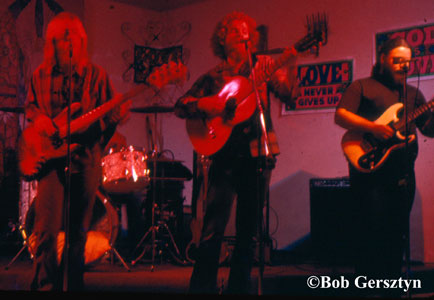
Love Song performing in 1973
PSF: How and when did Maranatha! Records begin? Talk about your involvement with it.
TC: I love what God did in that era. I think it's part of why Chuck Smith Sr.'s philosophy of ministry has developed the way it has. God was already doing something. He wasn't attempting to start something to see if God would bless it. The work of all these young people coming to Christ was already going on. It was something that God nourished. Nobody can take credit for that. It's a work of God. It wasn't just at Calvary Chapel (Costa Mesa, California) obviously. It was El Paso, Texas, Seattle, London, a little bit, Kansas City, Dallas, Ft. Worth. I've heard Dr. Edwin Orr, who is considered the world's foremost authority on revival history. He would say that the Jesus movement wasn't really a revival, it was really in another category that was literally a people's movement where it didn't affect all of our society per se, but hundreds of thousands, between half a million and several million people. Mostly young people, but then their whole family was pulled into the kingdom. So that was already going on, in the context of the Jesus movement.
PSF: When and how did you first become involved with Calvary Chapel and the Jesus movement?
TC: I came to Christ in March of 1970 and all the guys in Love Song came to Christ at the same time. Shortly after that, it was like an explosion and they kept expanding the church. Chuck Smith is from a full gospel background. He's not unaware of when God is moving and what it looks like. One of the things that I love about Pastor Chuck is that he just wasn't into kind of artificially propping that up or helping God. Something special was happening down here because Time magazine was coming down because it was getting a lot of news media.
The church was small. When I first went there, I thought that there were about 200 people, although I might say that it was 350, but it was a small, little tiny church. All of a sudden, you had all these people coming into the church to check out what was going on and all these groups started getting born. Groups like Love Song, The Way, Children of the Day, Daniel Amos and then you had Debbie Kerner, Ernie Rettino and you had all these groups start showing up with the songs they sang. It was very natural that within weeks literally, somebody would come up to us afterwards and say "I'm the chaplain over at juvenile hall in the Orange County jail system and I'm wondering can you come and play for the prison system." In another case, someone says "hey I'm at this Presbyterian church out here in Orange and we've got this church youth group and I believe it needs what you've got, can you come and do our church on Sunday morning?" Those things began to happen and pretty soon, it's "can you come and do Northern California" and things like that. The guys in the group didn't have any money- we were lucky to have a car and some equipment. We were all about ministering day and night and responding to those requests. So Pastor Smith said "I need to get these kids some gas money to get from place to place. We've got all these songs." I literally got a call one night, saying "all you guys are going to be involved in an album at a little studio that has 4 track recording called Buddy King's and you're all going down there to record your songs." That's how I found out about it.
So all of a sudden that was Maranatha One: The Everlastin' Living Jesus Music Concert. Chuck Girard was involved in taking over production once mastering started and he wound up finishing the album. If I remember right, there was supposed to be no more than $4,000 spent, but it wound up being $44,000 or $48,000, when it was done in 1970 and it came out in 1971. I didn't find out until 20 years later that Chuck Smith started it as a practical thing. You know, let's put out an album and then the kids can sell them when they go places and they'll have money to pay for the gas, because a lot of the time, these churches are giving them nothing, but in the places that they're going, there is nothing to be given. So what happened with that album when it first showed up, the first boxes of albums, we put them in Sunday School rooms at Calvary Chapel. By that time, we may have been across the street, I'm not quite sure. I remember seeing the album on the bigger lot across the way there, but it came out in 1971. Then somebody said that we need to incorporate this, saying that it's non-profit and that turned into, "well hey, we'll get some money coming back from these albums and let's send another group in like Children of the Day. Let's have them record their album." So it was a very humble beginning. It was not designed to be a record company. It was designed to just be a practical way to fund some of the ministry that was already happening.
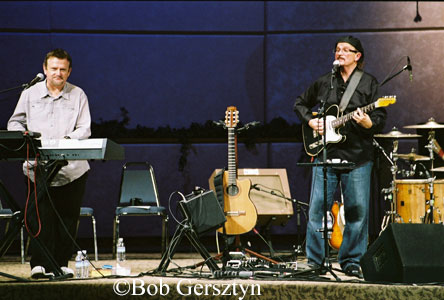
Love Song with Tommy Coomes and Chuck Girard, performing in 2010
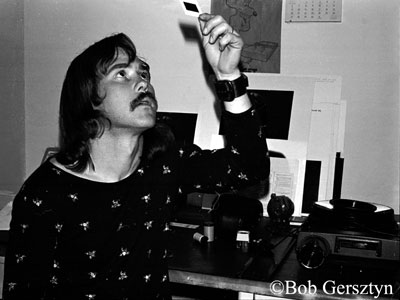
Pastor Bob Gersztyn in 1973